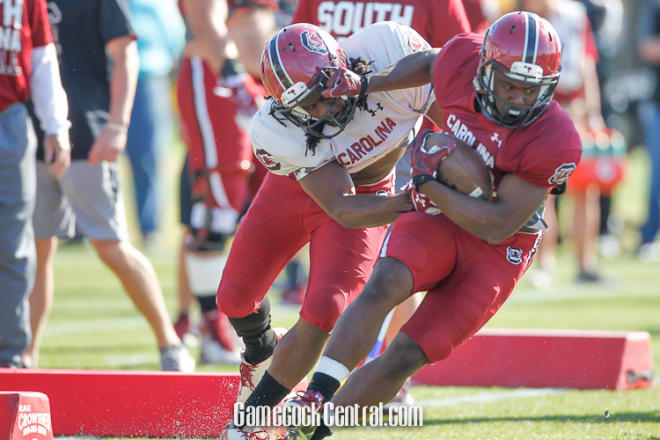Grading the Gamecock running backs, literally


College football players are always under a microscope, their every move being scrutinized by coaches, teammates, fans. If that player misses a block or an assignment, he’s going to hear about it from someone.
But what usually doesn’t happen is the player getting a grading rubric from a coach telling him exactly what he missed followed by a score at the bottom of the page.
However, that’s exactly what happens when South Carolina’s running backs meet to go over film.
“We’ll watch film and the next time we meet up we do install,” junior Rod Talley said. “So what usually happens when we watch film after they grade it, they give us our grade sheet and that’s when they tell us they’re going to change up the depth chart.”
Talley said under the old staff there was an informal grading system but nothing like what new running backs coach Bobby Bentley instituted this year. Players get an actual sheet of paper with different grades on it and those numbers can affect how much of the field a player sees.
Talley said the running back depth chart is “fluid” this spring and different players will start depending on their grades from previous practices. That grading fuels the competition on the field.
Talley, a former walk-on transfer from Gardner-Webb, is now competing with returning back David Williams and redshirt freshmen A.J. Turner and Mon Denson.
And with no clear favorite for the starting position, it makes the grading system a little more important.
“It’s a competition, but it’s an even playing field for all of us,” Talley said. “It just makes you work a little harder.”
The players are graded on three different things during practice: effort, assignment and technique.
For instance, if a player had 10 plays in practice and missed his assignment five times, he’d get a five out of 10 (or 50 percent) for the assignment section. Then the same scoring is done for technique and effort.
While assignment and technique both deal with skill and knowledge of the playbook, effort is the only category players are expected to score a perfect score on in every practice.
“Effort should always be a 10,” Talley said. “You should always give 100 percent because that has nothing to do with skill or assignment. After the play, finish strong.”
So with the starting running back potentially changing every practice, a lot can depend on a player’s grading.
A missed assignment or bad technique on one play could mean slipping from the top of the depth chart to second, from second to third or from third down.
While Talley said he’s just trying to get better over the spring, when it comes time to name a starter, he said he just hopes he’s separated himself enough.
And as for the grading, Talley just sees it as another part of the game.
“That’s something we get used to. It’s football; that’s how it is from this level up. It’s competition every single day,” he said. “It’s something you just got to get used to. You just got to compete. You have to be able to be critiqued. It’s not that big of a deal, really.”
Not a GamecockCentral.com member and want to get all the scoop? SUBSCRIBE NOW!
Never miss a moment with the GamecockCentral app: App Store - Google Play

